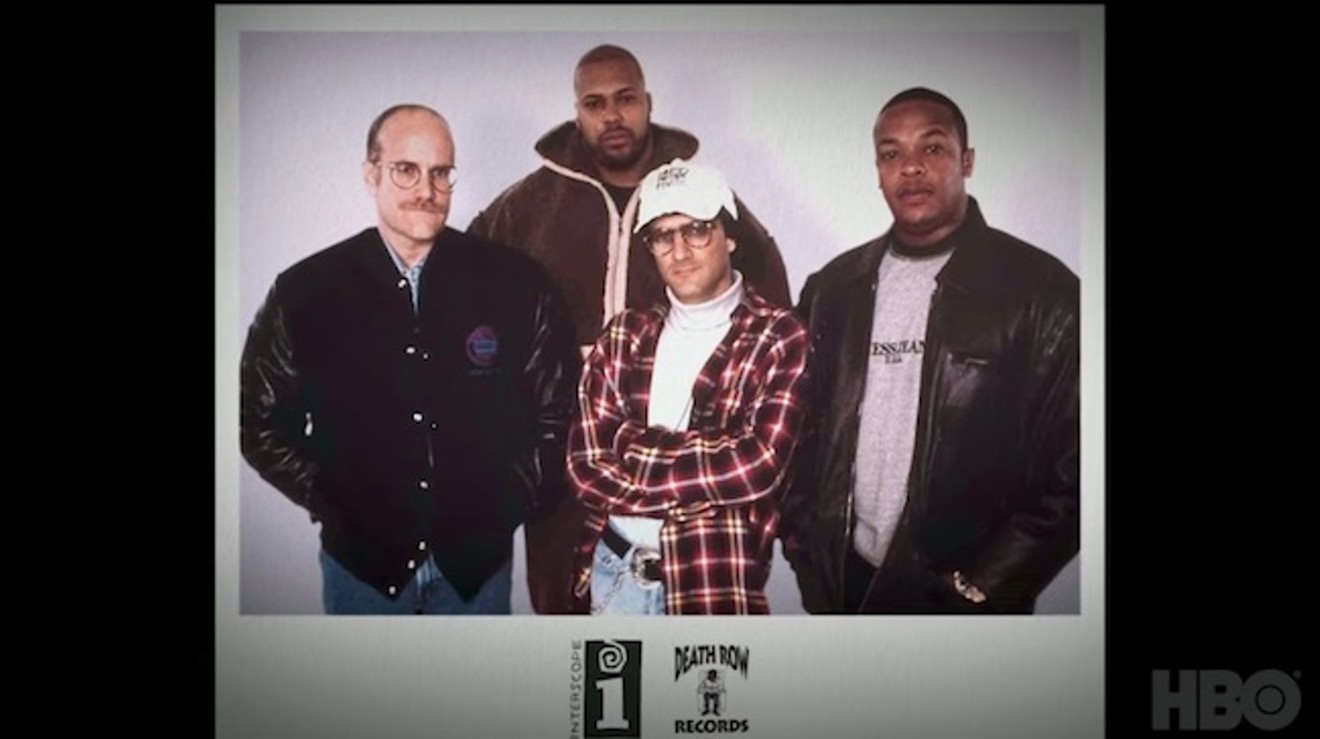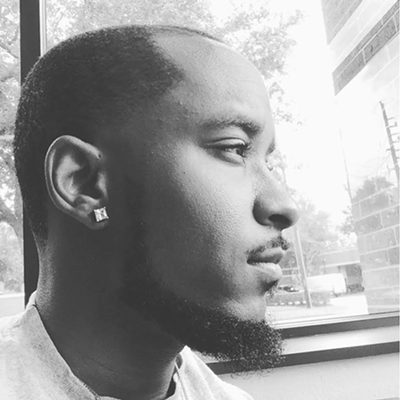In the recent documentary Can’t Stop, Won’t Stop, Sean “Puffy” Combs offers the most succinct reasoning for his want to succeed and hoping others follow his path. “The only place you gonna end up is God or crazy,” he says of being part of Bad Boy Records. There’s a legitimacy to that. Ma$e became a pastor in Atlanta following the release of his 1999 album, Double Up. Craig Mack, part of the first Bad Boy hit with “Flava In Ya Ear,” joined a convert. Loon, the smooth, charismatic rapper from “I Need a Girl Pt. I” and “I Need a Girl Pt. II” converted to Islam. The 90-minute doc captures the rawness of Combs by covering his tumultuous rise, all with a fun wink and nod towards the future.
By comparison, The Defiant Ones, the four-hour miniseries that wrapped last night on HBO, is about the story of not one man but two: Jimmy Iovine, who emerged as the biggest record executive in America during the 1990s and 2000s; and Dr. Dre, the sonic engineer behind G-Funk, N.W.A., and the rise of Eminem, Snoop Dogg and 50 Cent. The glossy, candid and eye-opening experience is documented by Allen Hughes of the Hughes Brothers (Menace II Society, Dead Presidents). Unlike his previous feature films, no one dies at the end of The Defiant Ones. His three-year passion project wraps up with Dre and Iovine together in arms, rich beyond their wildest dreams and yet still consumed with the next big get.
Combs, ironically enough, appears in both. While he’s less vitriolic in his own documentary compared to The Defiant Ones, he remains a presence you cannot ignore.
In their recent documentaries, all three men show an eclectic sense of shrewd genius. What is found with Hughes’ narrative style, however, is a willingness to be open and channel both conversations and memories with clear recognition of their context. Iovine rises from Brooklyn Italian kid to big-time rock producer; Dre is a precocious genius from Compton, California. They don't even meet until 1992, but over the course of 25 years, they've grown with one another. The doc opens by retelling Apple's 2014 purchase of Beats By Dre for $3.2 billion, leaving viewers laughing at how annoyed Iovine is that a supposedly top-secret merger has been blown up thanks to Facebook, of all things. Tyrese, alongside an obviously drunk Dr. Dre, begins to Crip-walk in celebration of the deal, which hasn’t even been completed yet. They were touting Dre as hip-hop’s “first billionaire” before the ink even dried. "One of the most embarrassing moments of my life," Dre says. In short, Tyrese ruins damn near everything.
You know how the story ends, though: the deal gets finalized and Dre leaps up the Forbes list at a rapid pace. It’s the first signifier that the doc is going to not only retell the stories of both Iovine and Dre; it will allow the notoriously private Dre to open up about his embarrassments, this being the first of many.
For four slick, riveting hours, we see artists and executives alike look back on Iovine’s rise with wry humor. Bono of U2 suggests that the band burned Iovine out working together on 1988’s Rattle and Hum. Tom Petty and Stevie Nicks share an intertwined story of how a song originally meant for Petty wound up being one of Nicks’ biggest hits. With Dre, there’s discussions of a mad genius constantly tinkering. We see him in his scrubs as a member of the World Class Wreckin’ Cru and how he famously had to teach Eazy-E how to rap his debut single, line for line. (The scene was recreated for effect in Straight Outta Compton.) Archival footage shows Dre and a young Snoop walking through the streets of New York shopping The Chronic and getting turned down repeatedly, echoed in later sessions of Dre and Eminem workshopping “My Name Is” as if the Detroit rapper is the perfect pupil. The film gives unprecedented access into the lives of both men, none more interesting than the footage of the football games that took place at Iovine’s house. No image seems more ‘90s and more awkward, given the aftermath of all parties involved, than Suge Knight pictured near John F. Kennedy, Jr.
The warts and tics of both men are displayed throughout The Defiant Ones, even though it’s set up as a split narrative between the rise of West Coast hip-hop and the label politics that kept Interscope afloat. Its rise begins as onetime obscure acts become global megastars and lightning rods for controversy. No act on the label gets as lengthy or gripping introduction as Tupac Shakur with Hughes' masterfully tricking footage from 1991's "Brenda's Got a Baby" video shoot as the perfect walkthrough of a soon to be cultural deity. Marilyn Manson, Trent Reznor and Shakur were all on the label at one point and Iovine and others retell the fight of getting out of a deal with Time Warner due to national scrutiny for obscenity. Right around the 1995 Source Awards does everything peak as Hughes carefully grabs reactions from those who were there — Nas, Puffy, Snoop Dogg and more.
An entirely separate documentary could be made about that night and the seeds it planted for the next two years of hip-hop, whether it be East Coast unity or how secondary acts got greater juice because of it. The scene however, opens up to more questions about Knight, the Death Row CEO whose legend of ruthlessness only grew after that night. When Hughes attempts to pry statements from The D.O.C or Dr. Dre or Puffy about Knight, or even their time during the bicoastal feud, the questions immediately get rescinded. “I’m not saying that on camera, Allen,” Dre says at one point in regards to knowledge of an alleged beating that took place at a Death Row office, confirming it without actually confirming it. The mogul also shies away from discussions about his late brother Tyree, who was killed in a fight while Dre was on the road with N.W.A. Even with Knight imprisoned and awaiting trial on a murder charge, the Death Row days remain tantalizing, mainly due to the sex, humiliation and violence that became prevalent.
“I was out of my fucking mind,” Dre states later in regards to his assault of Dee Barnes, which was left out of the 2015 feature film Straight Outta Compton, albeit maybe for good reason. Barnes appears as both historian and subject in the film, giving credence to both the rise and the messy split of N.W.A as well as Dre’s assault on her. On camera, Dre apologizes for the latter act, proclaiming that “no man should put his hands on a woman,” though there’s zero contention on whether the events of another recent biopic, Michel'le’s Surviving Compton, took place. It’s an interesting, understated piece of filmmaking that so many of the women in Iovine and Dre’s respective lives — wives, mothers, ex-wives, relatives and more — have a say about being around their genius. Barnes’ inclusion was mandatory and yet highlights an interesting contrast, considering she was friend and later unintentional foe.
Though no doubt an inspiring piece of filmmaking for musicians and creatives alike, The Defiant Ones fails to address one clear issue with Dre — his history of throwing away music and never being satisfied with a project of his own. The film offers small glimpses into this, yet zero theories or ideas as to why exactly the man who fine-tuned speakers for the studio, the car and more remains dissatisfied with some of his own creations. “I’ve made five albums since Detox was supposed to drop,” Snoop Dogg says. “Five.” Instead, fans got Compton, a soundtrack inspired by the 2015 film and a blunt indicator of his dissatisfaction with Detox. By contrast, Iovine sulks in his low points, recalling his part of the Death Row/Bad Boy feud as “funding Hamas.”
Even though the two appear friendly throughout the doc, speaking at weddings and public engagements, their dynamic seems more like that of a friendly working relationship and not a “brotherhood” kind of friendship. The Defiant Ones captures, in rather intimate and ambitious detail, the rise of various mavericks in the music industry over the past four decades with the last hour alone feeling like partly the rise of Eminem, partly a documentary on the rapid ascent of Beats headphones and the Apple deal. It ties itself up rather neatly, just as Iovine and Dre maybe would have wanted it.
After all, the victors normally get the prettiest pictures dedicated to them.
The Defiant Ones repeats many, many times throughout July across HBO's family of networks. See hbo.com for schedules.
Support Us
Houston's independent source of
local news and culture
account
- Welcome,
Insider - Login
- My Account
- My Newsletters
- Contribute
- Contact Us
- Sign out

In 'The Defiant Ones,' the rise of Dr. Dre (far right) and Jimmy Iovine (center) encounters strife and conflict, making for a hell of a documentary.
Screenshot/YouTube
[
{
"name": "Related Stories / Support Us Combo",
"component": "11591218",
"insertPoint": "4",
"requiredCountToDisplay": "4"
},{
"name": "Air - Billboard - Inline Content",
"component": "11591214",
"insertPoint": "2/3",
"requiredCountToDisplay": "7"
},{
"name": "R1 - Beta - Mobile Only",
"component": "12287027",
"insertPoint": "8",
"requiredCountToDisplay": "8"
},{
"name": "Air - MediumRectangle - Inline Content - Mobile Display Size 2",
"component": "11591215",
"insertPoint": "12",
"requiredCountToDisplay": "12"
},{
"name": "Air - MediumRectangle - Inline Content - Mobile Display Size 2",
"component": "11591215",
"insertPoint": "4th",
"startingPoint": "16",
"requiredCountToDisplay": "12"
}
,{
"name": "RevContent - In Article",
"component": "12527128",
"insertPoint": "3/5",
"requiredCountToDisplay": "5"
}
]
KEEP THE HOUSTON PRESS FREE...
Since we started the Houston Press, it has been defined as the free, independent voice of Houston, and we'd like to keep it that way. With local media under siege, it's more important than ever for us to rally support behind funding our local journalism. You can help by participating in our "I Support" program, allowing us to keep offering readers access to our incisive coverage of local news, food and culture with no paywalls.
Brandon Caldwell has been writing about music and news for the Houston Press since 2011. His work has also appeared in Complex, Noisey, the Village Voice & more.
Contact:
Brandon Caldwell
Trending Arts & Culture
- Best Bets: Earth Day, Noche Caliente and a Spring Festival
- Top 5 Sickest Stephen King Sex Scenes (NSFW)
- The Story Stalls But The Beat Goes On in The Cher Show at TUTS
-
Sponsored Content From: [%sponsoredBy%]
[%title%]

Don't Miss Out
SIGN UP for the latest
arts & culture
news, free stuff and more!
Become a member to support the independent voice of Houston
and help keep the future of the Houston Press FREE
Use of this website constitutes acceptance of our
terms of use,
our cookies policy, and our
privacy policy
The Houston Press may earn a portion of sales from products & services purchased through links on our site from our
affiliate partners.
©2024
Houston Press, LP. All rights reserved.





